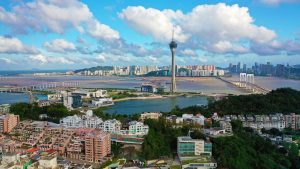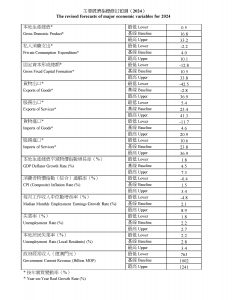The Centre for Macau Studies and the Department of Economics of the University of Macau (UM) have released the Revised Macroeconomic Forecast for Macao 2024. Based on the latest economic data in 2024, the research team anticipates that the economic slowdown in mainland China will have a relatively small impact on Macao and has, therefore, revised the projected number of visitor arrivals from mainland China to be 90% of the 2019 level. On this basis, the baseline forecast for Macao’s GDP growth is projected to be 16.8% (year-on-year real growth rate), which corresponds to 94.5% of the 2019 level, amounting to MOP 415.3 billion (calculated using the chain volume measures for the year 2021). The revised baseline forecasts for other major economic variables are as follows: the growth of exports of services is projected to be 23.4%; the overall unemployment rate is expected to be 2.2%; the unemployment rate of Macao residents is expected to be 2.8%; and the government current revenue is estimated to reach MOP 100.2 billion.
In 2023, visitor arrivals to Macao began to show signs of recovery, with the total number reaching 28.21 million, equivalent to 71.6% of the 2019 level. Among them, visitor arrivals from Hong Kong exhibited a faster rebound, reaching 7.2 million, which accounted for 97.8% of the 2019 level; while visitor arrivals from mainland China reached 19.05 million, representing 68.2% of the 2019 level. In contrast, the growth in visitor arrivals from other regions was slower. Only 1.97 million visitors from regions outside Hong Kong and mainland China were recorded, accounting for 47.7% of the 2019 level. On the back of tourism recovery, Macao’s exports of services surged to MOP 279.2 billion in 2023, accounting for 82.9% of the 2019 level. This marked a substantial year-on-year increase of 223.9% due to a low base in 2022. However, the growth in gaming expenditure by visitors was comparatively slower, reaching only MOP 145.4 billion, equivalent to 60.8% of the 2019 level. In contrast, non-gaming expenditure by visitors experienced a swift rebound, surpassing the 2019 level and reaching MOP 94.8 billion, which accounted for 121.5% of the 2019 level. Regarding domestic demand, both personal consumption and investment exhibited a steady recovery. In 2023, personal consumption expenditure reached MOP 109.4 billion, equivalent to 97.8% of the 2019 level; while gross fixed capital formation amounted to MOP 50.5 billion, representing 77.0% of the 2019 level. Prices remained stable in 2023, as evidenced by a consumer price index (CPI) inflation rate of just 0.9%. The labour market gradually regained strength, leading to a decline in the overall unemployment rate to 2.3% and the unemployment rate of Macao residents to 2.9% in the fourth quarter of 2023. The rates were still higher than the figures of 1.8% and 2.5% observed in the third quarter of 2019, but represented a significant decrease from the high of 4.0% and 5.2% recorded in the third quarter of 2022. Employment earnings rebounded swiftly, with median monthly employment earnings reaching MOP 17,600 in the fourth quarter of 2023, surpassing the MOP 17,000 reported in the same period in 2019.
In January and February 2024, total visitor arrivals reached 6.16 million, representing 88.3% of the 2019 level. Among these arrivals, 4.51 million were visitors from mainland China, accounting for 89.0% of the 2019 level; 1.16 million were visitors from Hong Kong, reaching 96.9% of the 2019 level; and 0.50 million were visitors from other regions, representing 69.2% of the 2019 level. Based on the above data, the research team anticipates that the slowdown in mainland China’s economic growth will have a smaller impact on Macao. As a result, they have revised their previous forecast assumption regarding the number of visitor arrivals from mainland China in 2024, now projecting it to be 90% of the figure recorded in 2019.
Based on the above assumption, the revised baseline forecasts for major economic variables are as follows:
· Macao’s GDP is expected to grow by 16.8% to MOP 415.3 billion (equivalent to 94.5% of the 2019 level).
· The exports of services are projected to surge by 23.4%.
· Personal consumption expenditure is forecast to grow by 4.0%.
· Total gross fixed capital formation is anticipated to rise by 10.5%.
· Inflation, as measured by the GDP deflator, is expected to increase by 4.5%, while consumer prices are projected to rise by 1.5%.
· Median monthly employment earnings are expected to increase by 2.1%.
· The unemployment rate is projected to be 2.2%, with the unemployment rate of Macao residents expected to be 2.8%.
· The Macao SAR Government’s current revenue is forecast to be MOP 100.2 billion.
About the Macroeconometric Structural Model of Macao
The Macroeconometric Structural Model of Macao is a quarterly simultaneous-equations econometric model covering seven blocks of Macao’s economy, namely consumption, investment, external trade, prices, government, labour market, and monetary sector. It includes 305 variables and 88 equations. The time series data start from the first quarter of 1998 and is updated once new data are available. Its results provide a timely understanding of the state of Macao’s economy and support prudent decision-making. The model was created by the late James Mirrlees, winner of the Nobel Memorial Prize in Economic Sciences and honorary doctor of social sciences of the University of Macau (UM), and faculty members in the Department of Economics at UM. Members of the research team include Chan Chi Shing, Ho Wai Hong, and Kwan Fung. The model is currently managed by the Centre of Macau Studies of UM.
| Source: Centre for Macau Studies | |
| Media Contact Information: | |
| Communications Office, University of Macau | |
| Albee Lei | Tel: (853) 8822 8004 |
| Jason Leong | Tel: (853) 8822 8322 |
| Email: | prs.media@um.edu.mo |


